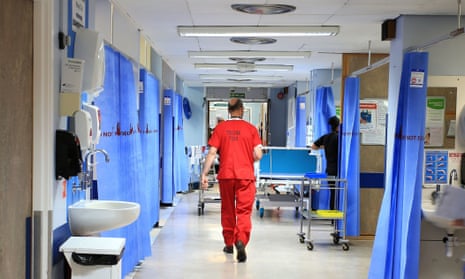Private healthcare does more than just undermine waiting lists for NHS patients (Hundreds of England’s NHS consultants have shares in private clinics, 21 January). Students, junior doctors and other healthcare professionals need training by senior NHS doctors. When private treatment goes wrong or isn’t enough to fix a problem, private patients end up back in the NHS system to fix any issues ahead of those who have waited.
As a junior doctor, I believe that we must keep our NHS public to ensure high standards of care for everyone. But with the NHS increasingly unable to deliver even basic care, I can understand why patients with the means choose to cut the queue. I understand why colleagues choose private work, when NHS constraints force us to lower the quality of our care, under deteriorating working conditions, with ongoing pay erosion.
Neither private patients prioritising their health, nor private clinicians prioritising better working conditions, are the villains here. Those in power who have systematically broken our national healthcare system are to blame. We need to make the NHS the best choice again, for patients and staff, to protect healthcare provision for the poorest and most vulnerable.
Name and address supplied
Your article seems to be attempting to paint hospital consultants in a bad light and to say that they are only interested in private practice and making money, possibly in an underhand way by referring patients to private companies that they have shares in.
The number of consultants with shares in private healthcare companies (according to the article) is less than 1% of the total number of consultants working in the NHS – the vast majority of whom do not undertake any private practice. This is just the latest in a long line of articles that undermine medical consultants who have trained for years to be able to help people to the best of their ability. It plays into the hands of the current government, which would love to dismantle the NHS and replace it with a US-style insurance system.
Gary Hartnoll
Retired consultant neonatologist, Chelsea and Westminster hospital
NHS hospitals in London spent £36m last year to buy a US firm’s private care (Report, 21 January) – there were pressing reasons for doing so. For example, cancer treatments have been delayed by the pandemic. If hospitals could now maintain activity levels 5% above pre-pandemic ones, it will take until 2033 to clear the cancer treatment backlog. However, if activity could be increased to 15% above pre-pandemic levels, the backlog across the cancer care pathway could be cleared by next year. It is feasible that the former activity level could be achieved by the NHS alone, but possibly at the expense of other services, which could be further delayed.
It is not possible for the NHS to increase activity by 15% over the pre-pandemic level without finding extra resources, and paying commercial medical services for use of their resources makes sense. Opposing such a pragmatic solution on the grounds that it might promote “creeping backdoor privatisation” is indulging a fantasy. Compared with health services in similar countries, the NHS has relatively poor outcomes for heart disease, strokes and cancer, and needs all the help it can get to improve our health.
Steve Iliffe
Emeritus professor of primary care for older people, University College London
